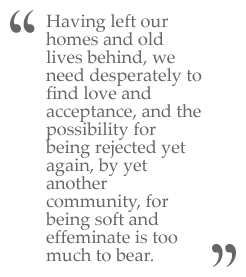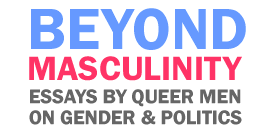|
 Having left our homes and old lives behind, we need
desperately to find love and acceptance, and the
possibility for being rejected yet again, by yet another
community, for being soft and effeminate—or even sick,
dirty, or contagious—is too much to bear. So we head to
the gyms, there to sculpt physiques that look strong and
healthy. Then we head to the locker rooms, where we keep
our heads down and hone on our finely tuned peripheral
vision, just as we did in high school. If we make
connections there at all, it is in the steamrooms, where
faces and eyes are obscured. Having left our homes and old lives behind, we need
desperately to find love and acceptance, and the
possibility for being rejected yet again, by yet another
community, for being soft and effeminate—or even sick,
dirty, or contagious—is too much to bear. So we head to
the gyms, there to sculpt physiques that look strong and
healthy. Then we head to the locker rooms, where we keep
our heads down and hone on our finely tuned peripheral
vision, just as we did in high school. If we make
connections there at all, it is in the steamrooms, where
faces and eyes are obscured.
It’s a sad tale, I know, and one I fear will add a new
label to my already-chafing nape: cynic. Am I risking
ostracism yet again? Who wants to be around a cynic,
after all? After all those hours I’ve spent in the gym,
the last thing I want to do is earn the scorn of other
gay men. My friend Toby, certainly, thought I was being
too critical of his French teacher. But if I am
critical, it’s because I’m an idealist. It’s because I
love men, and gay men in particular. And I think we can
contribute more than we currently do—to ourselves, to
each other, to the broader culture. I believe our
presence as queer outsiders in a heteronormative world
is illuminating. But we can only bring our own kind of
light to the world if we are, in fact, present—here,
now. Present to the reality that we will never
gain political, social, or personal acceptance by
disappearing ourselves, subsuming ourselves to bland,
outmoded notions of masculine identity.
Queer liberation means being accepted as we are. For
that to happen, we must each start by accepting, and
being, fully ourselves—masculine, feminine,
somewhere in the middle, or maybe somewhere entirely
outside of the gender binary. We’re almost there, too.
In coming out of the closet, we jettisoned expectations
about who we were supposed to be in order to find out
who we really were. Along the way, many of us gathered
with other gay men in urban enclaves. And although it’s
understandable that once there, we reverted to imposing
those old, familiar expectations on each other, that
strategy hasn’t brought us any closer to personal or
political liberation. It’s time to make a change.
It’s time to let go of those tired old expectations and
give ourselves permission to be who we really are. This
will require letting go of a lot of fear, the fear that
drove us into the closet in the first place: the fear
that we would be punished for failing to be just like
the other guys in the locker room. But guess what? Now
we are just like the other guys in the locker
room, in the gyms we’ve made for ourselves in places
like the Castro—so why are we still afraid? If we let go
of the fear and look each other in the eye, we will see
ourselves in each other. We will see the beautiful,
queer, imperfect boys—and men—that we were meant to be
all along.
|




11 COMMENTS ON THIS ESSAY:
If I had 1% more estrogen in my body, I would have probably cried my eyes out when I finished reading this. It was phenomenal! Thank you so much.
Brent Calderwood's essay reminded me of my Italian conversation class. My instructor had a bad habit of constantly interupting me to correct my Italian but when it came time to decribe my ideal mate I corrected my teacher: "Non e' "lei', e' "lui"!" (Translation: It's not "she", it's "he"!) After that my intructor had to constantly prove how liberal and pro-gay she was, the cute Chilean class mate changed his mind about going to the movies with me and most of the other students were cool. It was a great way to come out in another language. Back to Brent's main point, it was a sad day when I realized there is as much pressure to conforn inside the gblti community as outside in the larger world. Joe
A great essay for sure, although I am not sure I completely agree: being gay does not necessarily mean you have to be swishy and skinny. I am sure some people are uber-queers hiding in muscle/macho bodies for fear of rejection, but there are some of us who just like how we look when ripped and who do like cars, sports, home renovations, sitting on the sofa drinking beer, burping and scratching ourselves, etc... I've even been accused of "trying to act to macho and I wasn't pulling it off", but the truth is, this is the way I act and who I am.
I agree with you Nicolas, the idea that being gay is pure formula, kind of suggests, to me, that being gay is a commercial pursuit.
That's why i consider myself to be queer, and never gay.
Gay has been rendered into retreat, and if you don't behave a certain way, fellow gays will assume you are scared, or closeted.
There is a constant fight, and it isn't just with the hetero standard but it exists amongst ourselves.
“You’re not supposed to use the masculine form of the possessive. You should say, ‘Her eyes, her hair.’”
This reminded me of when i said Loca instead of loco, my teacher scolded me, but i explained that the masculine and feminine are traits of the past and that soon they will be left behind.
Nice essay
It really is a sad tale!
You burst my bubble about SF.
Guess I'm a bit of an idealist myself.
Anyway, you've made an interesting point here.
Tnx :)
Have you ever been to the town of Sitges, Spain? (Near Barcelona). It is full of super-pumped gays with the biggest muscles I've ever seen. When you walk into Sitges as a tourist all you see is the same type of gay men. No families, no old people, no women (except the tiny lesbian minority). It was very bizarre to me at first because where I grew up (Coventry, UK) the gay scene looked the complete opposite: skinny jeans on painfully skinny boys, indie shirts and emo haircuts.
Nocolas--
I don't think he was saying that gay men are supposed to be effeminate; I think he was saying that many of those who happen to be effeminate are forced to hide it, which is dishonest and sycophantic. So I don't think there is any need for masculine gay men to be upset by his premiss.
And we all know how many "straight-acting" fellows there are out there. They even claim, literally, to "act" straight (since that's what a "real" man acts like, apparently, except that they still have sex with men, funnily). Yet, for some reason, we never point out their dissemblance--only that of the gays who pretend to be flamboyant queens.
Talk about a double-standard.
Excellent essay. It made me tear up a little.
Actually I think that the epithet-spewing cowards hiding in a fast car are proof that we're winning. It takes a long time to change the world.
Gay men bring all kinds of hate and insecurity with them into adulthood; we play out the bitchiness and throw shade because it's what we were taught in junior high. I'm hopeful this, too, will diminish as the younger generations have better and better role models to emulate.
Patience. We're winning.
Why can't people just be who they are?
We are born alone and we die alone. Everywhere in between we try to fit in by finding other people who share our values and interests. People always gravitate toward others with whom they have something in common. Who can really say that the people you observe in the Castro are "hiding inside the suits of armor they’ve created" or, are just being themselves? Do "before and after" pix exist?
Who exactly is protecting themself from being rejected by other gay men?
I think it is easy to generalize when looking from the outside into any of the many gay sub-cultures. Although I have no doubt that self-hatred is and probably always will be a fact of life for many people due to what is perceived as non-acceptance (whether it be gender, race, sexual preference, age, etc.), it is still up to each individual to find for themself where that place is that they will no longer feel fear. It is the responsibility of the rest of us to allow them their journey along the path of life and perhaps even make a friend or 2 along the way. What really makes all of us strong (therefore taking away all fear) is respect for all the diversity among our people.
Yes, look each other in the eye and see ourselves in one another.
Brent, your essay makes some very important points about acceptance (not tolerance) and how much further American society has to go to achieve that goal. I really appreciated that your essay made that point explicitly and clearly.
Your opening vignette about your friend and his French teacher, however, unfortunately, is not quite right. In the French language, possessive pronouns (my,his, hers theirs...) are NOT related to the subject (your friend in your example), but the object of possession. That is to say, whether you are a man or a woman, you use the same adjectives to designate hair, eyes (both of which are plural in the French). So, the teacher was absolutely right in correcting your friend -- it is not the masculine singular (son -- his eyes), but the plural (ses yeux, ses cheveux -- eyes and hair both in the plural in French). This is not just a nit picky grammar point. There is NO way you can give away the gender of the person you are describing if you do not explicitly state his/her gender. Anne Gareta (if you read French) has written an entire novel (Sphinx, 1986) about the love between two people in which the reader never finds out the gender of the main characters, a task that would have been impossible in English.
Having said all this, I appreciate the point you try to make -- people can be so heteronormative, that they refuse to acknowledge the possibility that same sex relations could and do exist.
Brent,
I wonder how much of this bulking and gym behavior have something to do with AIDS as much as with Masculinity.
I remember the days of wastings, of KS and of trying all kinds of things to "feel better".
I think we have also gone overboard on the gym as a way to in some way reclaim our bodies, or make it so folks don't see us as "sick".
Or maybe a bit of both.